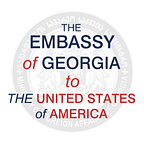Georgia Remembers 2008 August War Victims
After nine years of 2008 Russia-Georgia war — despite tremendous peaceful efforts by the Georgian Government as well as the international society — the situations in Abkhazia and Tskhinvali region/South Ossetia have not improved. On the contrary, occupation of 20 percent of Georgian territory by the Russian Federation still continues.
We are now witnessing the process of factual annexation of Abkhazia and South Ossetia/Tskhinvali regions, through incorporation of these territories into Russia’s military, political, economic and social systems. This integration is based on the so-called “integration treaties” and follow-up field “agreements”. Although the Russian Federation pledged to withdraw its military formations from Georgia under the EU-mediated 2008 Ceasefire Agreement, Moscow continues to further intensify its military build-up in the occupied regions. This represents a direct threat to security and stability not only for Georgia, but also for the entire region.
A statement by the Ministry of Foreign Affairs of Georgia points out that the “Russian Federation envisages the illegal integration of Abkhazia and Tskhinvali regions of Georgia into Russia’s military, political, economic and social system; military build-up in the occupied regions, as well as fortification of the occupation line by razor and barbed wire fences and different artificial barriers. At the same time, illegal detentions and kidnappings of people along the occupation line, restriction of freedom of movement and access by residents of the adjacent territories to their farmlands and houses regularly take place. This situation has been even more aggravated by closure of four so-called crossing points in Abkhazia region.”
Ethnic discrimination toward Georgians living in the occupied territories and violation of their fundamental rights continue. While hundreds of thousands were expelled from their homes, the Russian occupation regime treats the remaining Georgian population in Abkhazia and Tskhinvali regions as foreigners in their own homes. Following the restriction of Georgian language in Gali district schools, the native language are prohibited in Georgian schools in the Tskhinvali region as well. Against this background, the Russian occupation regime is trying to further isolate people living in the Abkhazia and Tskhinvali regions, and intentionally hinders their humanitarian contacts with the rest of Georgia and the world.
After nine years since the 2008 war, it is needless to reiterate that Georgia is firmly committed to the peaceful resolution of the conflict. In contrast to the Russian Federation, the Georgian Government stays in compliance with the EU-mediated Ceasefire Agreement. Awaiting for reciprocity from the Russian side, Georgia has many times reaffirmed the legally binding non-use of force pledge. Furthermore, Georgia also intensified its engagement policy toward reconciliation and confidence building between the divided communities. These peaceful efforts face increased challenges from the Russian side, including strengthening the occupation line with different artificial obstacles.
The Ministry of Foreign Affairs said that despite all of the challenges, Tbilisi is committed to resolving the dispute peacefully: “Despite Russia’s provocative actions, the Government of Georgia continues its unwavering peace policy and strives for peaceful conflict resolution through diplomatic means, negotiations and dialogue. In contrast to the Russian Federation, Georgia stays in firm compliance with the 12 August 2008 Ceasefire Agreement, and through constructive engagement, tries to achieve a tangible result in the Geneva International Discussions. Furthermore, against the backdrop of permanent use of force by the Russian Federation in the occupied territories, Georgia has many times confirmed its legally binding commitment on non-use of force, inter alia, on executive and legislative levels. Besides, the Government of Georgia resists barbwire fences and artificial barriers erected along the occupation line with intensified policy of building confidence and ties between the war-torn communities.
As a result of this rational and peaceful policy, and despite difficult challenges, the Government of Georgia managed to turn the democratic and economic development of the country into irreversible process, achieved peace and stability in its controlled territory, and made progress in the European and Euro-Atlantic integration.”
The Russia-Georgia war resulted in the death of 228 Georgian civilians, 170 soldiers, and 14 police officers, and displaced 192,000 citizens in Georgia. Many were able to return to their homes after the war but only after several years and more than 20,200 people remain displaced.
It is of vital importance that after nine years of Russian occupation, the international community remains vocal and decisive against continuous aggression and provocations from Russia. It has taken effective measures in order to cease alarming developments in the affected Georgian regions. It is crucial that the international community is united in keeping the issue of conflict resolution in Georgia high on the agenda with the Russian Federation. Needless to state that only a consistent and firm stance against Russia’s occupation and annexation policy can ensure progress. Georgia is grateful to all of its international partners and appreciates their support the country’s territorial integrity and sovereignty.
See More: US Department of State, The United States Urges Russia To Respect Georgia’s Sovereignty and Territorial Integrity
